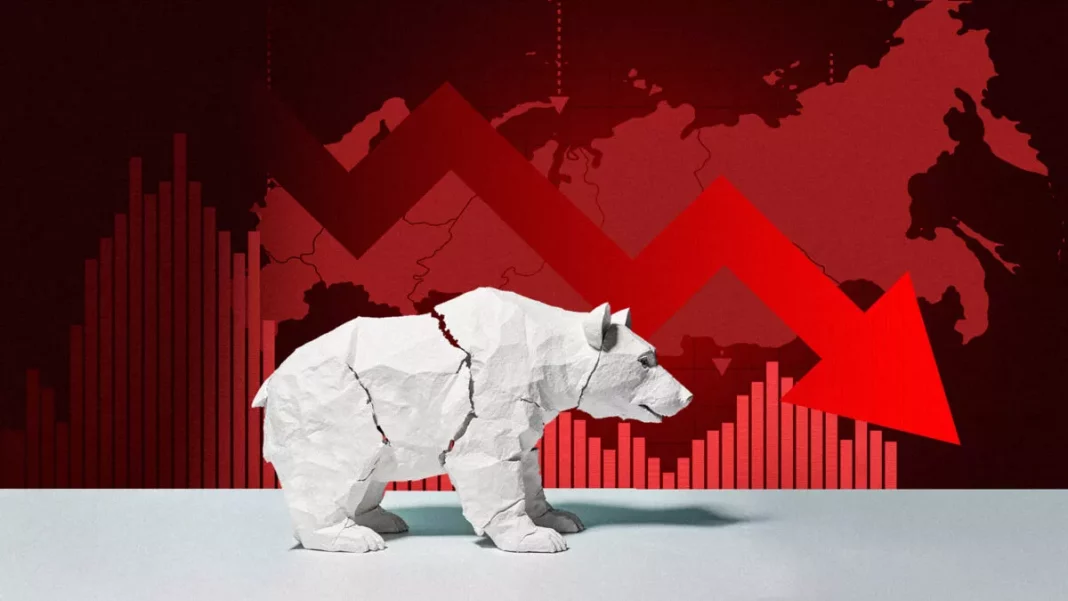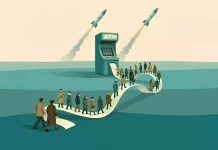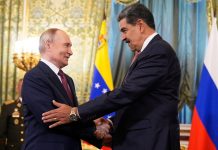By EUvsDisinfo
The Kremlin’s planners prepared well for their full-scale invasion of Ukraine, building up currency reserves and later boosting growth through military spending. But the Russian economy is beginning to show signs of weakness as Moscow’s illegal war continues.
For years, Russian state outlets and pro-Kremlin commentators have boasted of Russia’s great economy despite Western sanctions that greatly intensified after Moscow’s full-scale invasion of Ukraine in February 2022. Initially, they had cause for optimism. Before the invasion, Russia built up enormous foreign currency and gold reserves intended, in retrospect, to see Moscow through its war. Then, in 2023 and 2024, the country grew at a 4.1 per cent rate. The main reasons were elaborate schemes to evade sanctions and ‘military Keynesianism’, or the Kremlin’s decision to spend its reserves on military purchases that provided a short-term economic boost.
But now the reserves are running out, and Russia’s militarised economy is creaking. The signs are everywhere. Interest rates are in double digits as the Central Bank of Russia tries to dampen inflationary pressures. The government’s budget deficit is widening, and plans to raise funds through taxes will likely push inflation higher. Meanwhile, Russian revenues from fossil fuel exports have dropped over the past year, continuing a long-term decline since the full-scale invasion began. Ukrainian strikes against Russian refineries recently pushed gasoline prices inside the country to record highs.
However, pro-Kremlin commentators remain optimistic, with one recently alleging that ‘the Russian economy is a fortress’. Another claimed that ‘Russia proved the great strength of its economy.’ One article misrepresented a Financial Times story to assert that the Russian economy has become a ‘gold mine’ for a ‘generation of winners’. The actual piece does not use these phrases. Instead, it exposes how Russian players, often benefitting from government subsidies, ‘gobbled up the spoils’ in a less competitive environment by buying up assets left behind by departing Western companies in the wake of the full-scale invasion.
More recently, Russian President Vladimir Putin declared that ‘a recession is still a long way off’. Let’s see. Russia narrowly avoided a technical recession in the second quarter of 2025, the World Bank is warning of long-term stagnation, and the Moscow stock market is suffering sharp drops.
In the longer term, the situation becomes more dire. A recent Carnegie report shows that Russia is planning to spend a substantial 8 per cent of its GDP on defence and security, thus demonstrating that the war in Ukraine is a priority. To foot the bill for military expenses, the government plans to increase taxation and borrowing, measures that will have their own future costs. The budget also relies upon some optimistic assumptions such as a Brent oil price of USD 70 per barrel in 2025-27. The price now is closer to USD 65. And every rouble spent on the war takes away from spending on education, healthcare, and infrastructure, areas more important for future growth.
FIMI campaigns to deny the impact of sanctions
Meanwhile, Moscow’s FIMI campaigns regarding EU sanctions, repeated again and again, that sanctions do not work and never have. In fact, the Kremlin has it, they have made the Russian economy stronger and even turned Russia into an economic superpower. Russian intelligence services allege that EU experts have told the European Commission that sanctions on Russia only hurt the bloc. The 19th round of EU sanctions proposed in September was met by pro-Kremlin commentators who pretended to question why an additional round would work, when previous rounds supposedly had not. One article falsely claimed that sanctions ‘have primarily penalised European economies, with persistent energy inflation, trade tensions, and a loss of competitiveness vis-à-vis emerging markets.’ Other articles sought to push a disinformation narrative that the EU would collapse after a 20th or 21st package, and that Europe is ‘digging its own graveyard with these anti-Russian sanctions’.
However, outside the Kremlin bubble, little doubt exists about the sanctions’ gradual toll on the Russian economy. According to a recent report, they ‘have raised the costs of [Russia’s] critical imports, cut down on export revenues, and riskily exposed the economy to a growing dependence on trade with China. Russia’s reliance on turbocharged spending via military Keynesianism has collided with its chronic labour shortage, further fuelling a domestic inflationary cycle’ driven by suppliers’ higher costs of transport, insurance and sanctions risk.
The verdict is clear. Sanctions have forced Russia’s economy into serious headwinds. The end of this road might not be a total economic collapse, but it is certainly economic stagnation and less resources for Putin’s brutal war. Don’t be deceived: It is an undeniable fact that Putin’s crusade against Ukraine has cost Russia dearly.
By EUvsDisinfo





